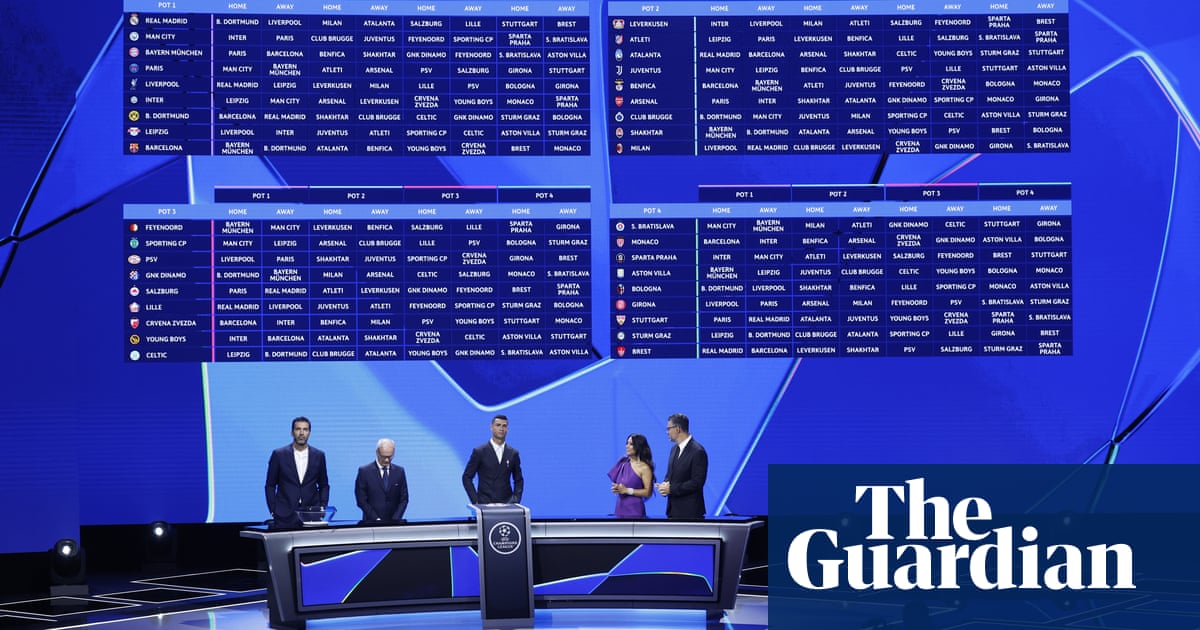Once more, with seeding. Uefa’s new Champions League group-stage format is known as the “Swiss system”, and frankly you can write your own jokes there. It’s full of holes. It’s totally unaccountable and its inner workings largely impenetrable to outsiders. It’s a handy conduit for sequestering and laundering the money of some of the world’s worst people. It’s a complex and morally contested way of putting people to sleep for long periods of time. Take your pick.
Perhaps fittingly, it is in Switzerland that the first strides into this bold new era take place, with Young Boys v Aston Villa selected as the early Tuesday kick-off, alongside Juventus v PSV. And of course this is an emblematic choice for other reasons, too. The Berne-based club may be competition outsiders, having secured their spot in a playoff against Galatasaray last month. But domestically they have been an insuperable force, claiming their sixth Swiss title in the past seven years despite a season marred by internal wrangling and insipid route-one football.
How have they done it? Back in April, the Swiss Football League published the latest set of club financial figures, which showed that Young Boys have basically left the competition for dead. Nobody else gets close to them on wages, revenue, assets, profit, league points. Their broadcasting income last season was roughly equivalent to that of all their Super League rivals put together.
And of course the vast majority of this income derived from the Champions League, allowing Young Boys to invest in a league where everyone else needs to sell. This year’s competition should make them a guaranteed £36m, more than the annual revenue of all but one of their Swiss Super League rivals and – by a happy coincidence – the planned cost of the new centre of excellence they are building on the outskirts of Berne.
Many of the medium-sized leagues in Europe have a similar tale to tell. Shakhtar Donetsk have won six of the past seven titles in Ukraine, Red Star seven in a row in Serbia, Dinamo Zagreb seven in a row (and 18 of the past 19) in Croatia. Local factors may vary, but the common thread linking all these chains of dominance is Champions League revenue, which even in modest sums has the capacity to warp domestic competition into pointlessness.
And so it is a very particular kind of person who surveys this landscape and decides that what the modern competition really needs is bigger windfalls. But then this has always been the rationale behind the expansion of the group stage, for all the spiel about “jeopardy” and the glossy Uefa promotional videos where Zlatan Ibrahimovic lionises the new format because “the fans deserve more action”.
Meanwhile, you can well imagine the bemusement in the corridors of Aston Villa at the backlash over their inflated Champions League ticket prices, given that a commitment to shake down fans, brands and broadcasters for as much as they can give is about the closest thing the competition possesses to a set of core values. What did you think this thing was about? Glory?
And so while Uefa has promised that the competition will make more sense once it begins, in a way its logic is already clear enough: content for the sake of content, more matches for the sake of more matches, a structure erected for the benefit of the continent’s biggest clubs and the investors who fund them. Eight games each for the first time. Wimbledon-style seedings in the knockout rounds for the first time. Group games in the new year for the first time since 2003, thus bringing not just the winter break but the January transfer window into play.
Meanwhile, all the talk of jeopardy probably requires a little context. Whereas the old format of eight groups required 96 games to eliminate 16 teams, this format takes 144 games to eliminate just 12 teams. A single 36-team league table will define qualification for the knockout stages, with the top eight going straight through and positions nine-24 going into two-leg playoffs.
What does this mean in practice? According to the website Football Meets Data, which has run 10,000 simulations of the group phase, 17 points pretty much guarantees you a spot in the top eight. Nine or 10 points should get you a playoff. And so one of the classic issues of the old group phase – dead rubbers – remains unsolved, with ample potential in the last couple of rounds for mismatches between teams still fighting and teams already qualified or eliminated, and perhaps tempted to rest a few players in anticipation of tougher challenges.
Throw in the fact that everyone has a different set of eight fixtures, and it is clear that the new format is a continuation of a wider process by Uefa, in which sporting integrity is gradually supplanted with the confected thrills of the television gameshow. After all, if your aim were simply to find the best team in Europe, you would have a round-robin league where everyone plays everyone. By contrast, if your aim were to maximise jeopardy and make every match matter, then you would simply operate a straight knockout (as was the case until 1991).
But Uefa craves neither of these. Instead you have a process that has essentially been reverse-engineered from the desired outcome: the best teams playing each other from the start, but not to the extent that they start knocking each other out, because you still want them to be playing each other at the end. The meaninglessness, the lack of context, the confusion over whether, say, Liverpool v Real Madrid on 27 November actually matters: this is not a glitch or design flaw but intentional, baked into the design.
after newsletter promotion
And so the really arresting part of the new format is actually not how much has changed, but how little. Last season, the Opta supercomputer predicted there was a 79% chance that the winner would come from one of the top eight-ranked clubs in the competition. This season that percentage is 80%. Manchester City had a 99% chance of making the last 16 last year and a 95% chance now. The seeded knockout stage is another sop to the giants after two successive seasons in which there were definite stronger and weaker halves of the draw, producing underdog finalists in Borussia Dortmund and Inter.
That these two former winners can even be described in such terms is a measure of how rapidly the terrain has narrowed. But amid the novelty and rearrangement, a familiar pyramid of favourites again emerges: City and Real Madrid clear at the top, followed by about half a dozen outside challengers in Bayern Munich, Paris Saint-Germain, Barcelona, Liverpool, Arsenal and Inter.
Not Bayer Leverkusen? Probably not, even if their draw is kind and the new format offers Xabi Alonso’s squad a little more time to accustom themselves to the competition. The same can also be said of Girona, Atalanta and Stuttgart, the revelations of last season who will assuredly find the going tougher this time round. Villa have some delicious fixtures and should be capable of securing a playoff place. Celtic, meanwhile, have one of the most favourable draws on paper but will need to find a balance between adventure and caution.
At which point it is worth considering exactly what success would feel like for the new-look competition. More thrills? More upsets? Fewer dead games? Higher television audiences? Somebody finally working out the point of Benfica? Or does it simply feel like what success feels like in any other year: an affirmation of existing financial realities, with the richest clubs simply triumphing in more convoluted and lucrative ways?
Because amid the new dawns and new rules, there is of course a familiar endgame in sight, one in which the biggest clubs simply resolve to extract even more concessions next time round. If a group stage can consist of eight games, then why not 10 or 12 in the future? There are still plenty of spare midweeks in the calendar to cannibalise. Italy and Germany may have earned the two extra slots this season, but why not just hand extra slots to England and Spain too? And how long before the powerbrokers decide that Manchester United and Chelsea – however competitively inept – simply have to be in this thing for the eyeballs?
Football fans are naturally conservative animals, tied to ritual and seasonal routine, naturally wary of change. The instinctive reaction to any innovation is to envisage all the ways it can fail, and from confusion to tedium to unfairness there is no shortage of contenders in that respect. But this is, in fact, not the worst scenario. If you’re worried about what happens if the new Champions League fails, you should see what happens if it actually succeeds.









